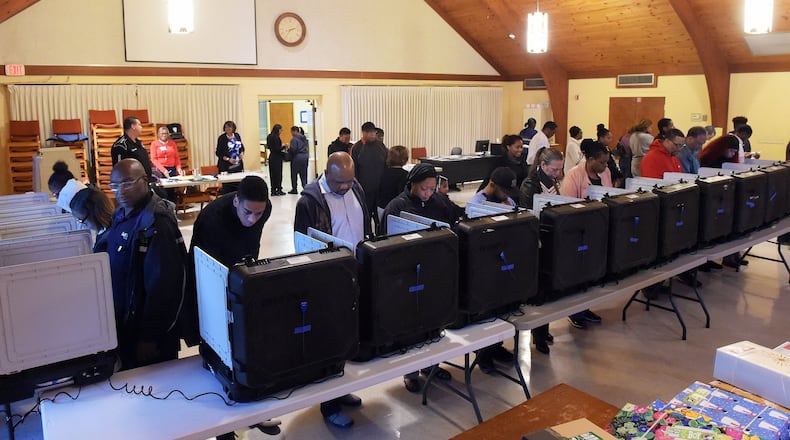Churches are returning to the fold as polling places in Georgia.
After some churches backed out as voting locations because of the coronavirus pandemic, they’re now reopening their doors to a flock of voters expected in November’s presidential election.
Church leaders see their role in elections as an extension of their mission to serve communities after some voters waited in long lines for hours in Georgia’s June 9 primary.
With a clear need for more precincts, churches answered the call.
“We refuse to have what happened in June happen again in November,” said Bishop Reginald Jackson, who supervises over 500 African Methodist Episcopal churches in Georgia. “There’s no excuse to have less than an adequate number of polling sites and not enough poll workers. All of the AME churches have agreed to become polling sites if they’re needed.”
The coronavirus pandemic hasn’t abated since the primary, but Jackson said church leaders will make sure they take precautions — such as masks and social distancing — to keep voting safe.
Churches are critical for elections, normally making up 35% of Georgia’s precincts, according to an analysis of polling places by Georgia News Lab, an investigative reporting partnership among Georgia universities and GPB News.
But when the coronavirus hit, churches prevented the spread of the illness by shutting down their buildings. While it’s unclear how long the public health threat will remain, many churches have resumed holding services with the same kind of cleaning, distancing and masking precautions that would help protect voters.
Credit: Bob Andres
Credit: Bob Andres
“We’ll do our part,” said Mike Higgins, director of facilities for Saint Jude the Apostle Catholic Church in Sandy Springs, a voting precinct for nearly 3,900 registered voters before the church closed last spring. “The more locations we can have, the more people we can have getting out voting.”
A shortage of polling places contributed to long lines for many voters, especially in cities with high numbers of voters but not enough locations to cast their ballots.
Election officials relocated 10% of polling places statewide before the primary election, including nearly 80 in the greater metro Atlanta area. Precinct closures included a dozen churches in Fulton County along with smaller numbers shuttered in surrounding areas.
Secretary of State Brad Raffensperger welcomed church leaders’ response to the need for more polling places.
“For the November election to be a success, we must focus on community-driven solutions,” Raffensperger said. “We are working with groups across our state to help counties expand polling places, recruit additional poll workers, and train additional election techs.”
County election officials will decide which facilities will be used as polling places based on their locations, size, electrical capacity and accessibility.
In Fulton County, which experienced the bulk of election day problems, election officials plan to increase the number of voting sites from 164 in June to between 210 and 240 in November.
Credit: RAISA HABERSHAM/RAISA.HABERSHAM@AJC.COM
Credit: RAISA HABERSHAM/RAISA.HABERSHAM@AJC.COM
Some churches are still wrestling with reopening decisions.
“We’re still closed right now, but we’re trying to slowly get people back in,” said Trevarious Worthy, operations manager at Trinity Presbyterian Church in Buckhead, which before the pandemic served over 3,500 registered voters. “This is new to all of us.”
United Methodist Churches in the North Georgia Conference can each contact their county election officials to make arrangements for opening during the election, according to a message from Bishop Sue Haupert-Johnson.
Reopening church polling places will alleviate some of Georgia’s voting difficulties, but a successful presidential election will depend on how well officials adjust to the pandemic and an expected record turnout of over 5 million.
Besides adding precincts, election administrators are hiring more poll workers, retraining them, launching a website where voters can order an absentee ballot, and placing tech support staff across Georgia to help prevent difficulties operating the state’s new voting equipment.
The Rev. Gerald Durley, former president of the Concerned Black Clergy of Atlanta, said churches should make voting as open and accessible as possible.
“This is an integral part of our ministry. We don’t tell people who to vote for, but we start with the opportunity,” said Durley, pastor emeritus for Providence Missionary Baptist Church in southwest Atlanta. “We’re more needed now than ever before.”
Find your voting location
County election officials will continue adding and updating voting locations in the weeks leading up to the Nov. 3 presidential election. Precincts could change on short notice if locations become unavailable because of the spread of the coronavirus.
Voters can check their polling places online on the state’s My Voter Page at www.mvp.sos.ga.gov.
All registered voters are also eligible to vote remotely by casting an absentee ballot. To receive an absentee ballot, voters can print, fill out and return a form to their county’s election office. Absentee ballot applications are available on the secretary of state’s website.
About the Author
Keep Reading
The Latest
Featured






